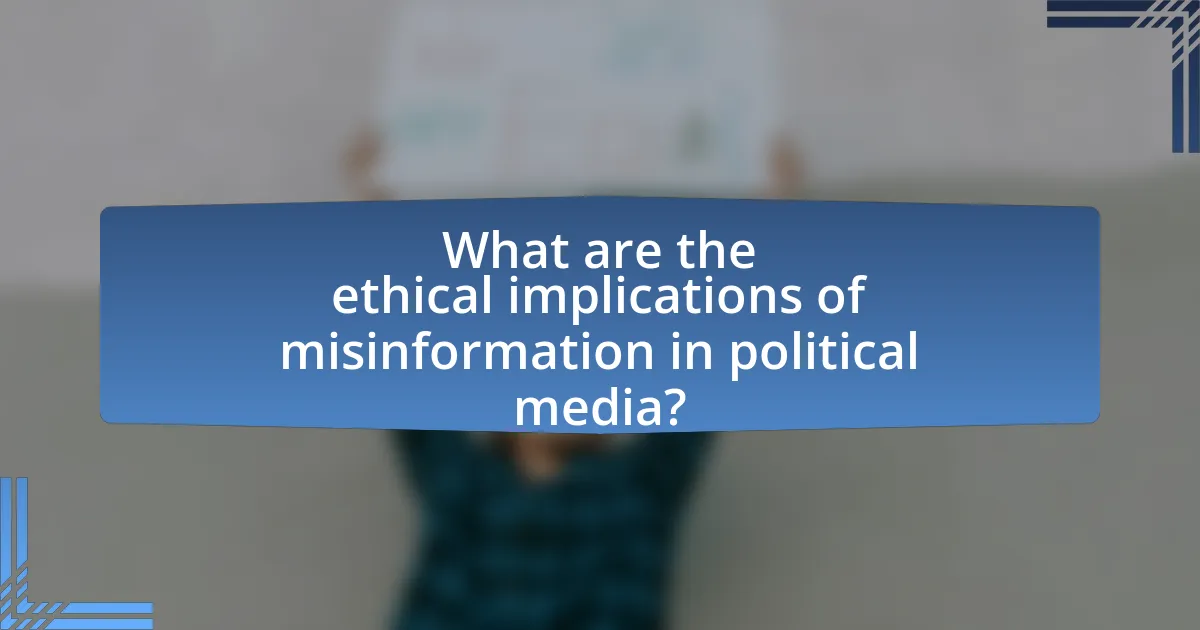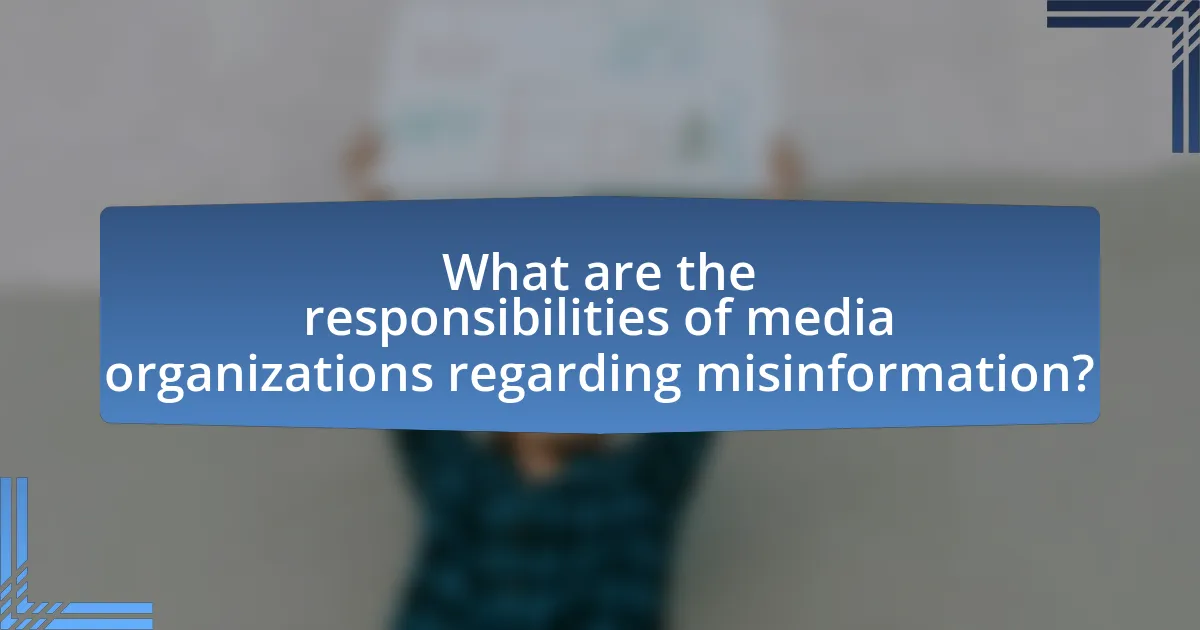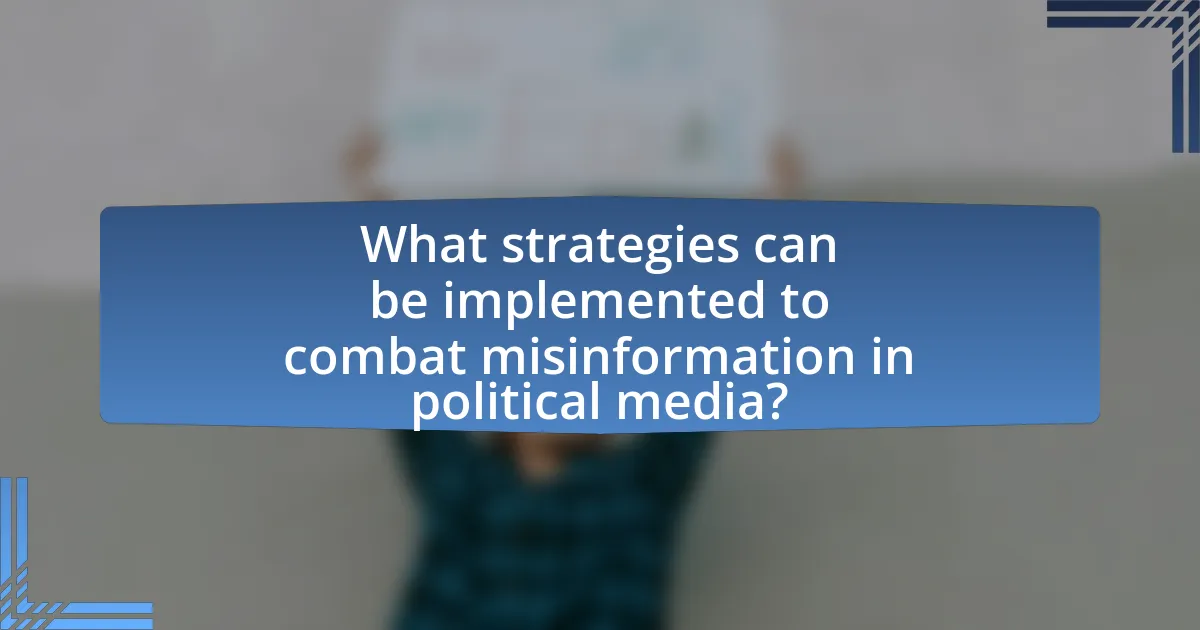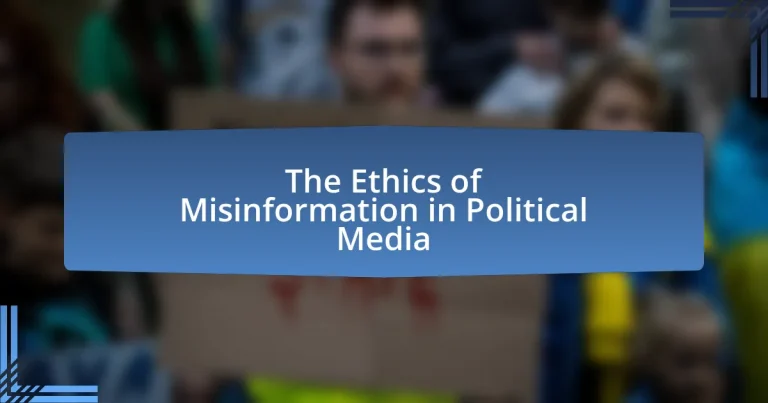The article examines the ethical implications of misinformation in political media, highlighting its detrimental effects on democratic processes and public trust. It discusses how misinformation distorts public perception, influences voter behavior, and exacerbates polarization, particularly through the role of social media in amplifying false narratives. The article emphasizes the responsibilities of media organizations in ensuring accuracy, the importance of fact-checking, and the need for media literacy among the public to combat misinformation effectively. Additionally, it explores the potential consequences of unchecked misinformation and outlines strategies for individuals and communities to identify and address false information in political discourse.

What are the ethical implications of misinformation in political media?
Misinformation in political media raises significant ethical implications, primarily undermining democratic processes and eroding public trust. When false information is disseminated, it can manipulate voter perceptions and decisions, leading to skewed electoral outcomes. For instance, a study by the Pew Research Center found that 64% of Americans believe fabricated news stories cause confusion about the basic facts of current events. This confusion can result in polarization, as individuals may align with misinformation that reinforces their biases, further fracturing societal cohesion. Additionally, the spread of misinformation can lead to accountability issues, as political figures may exploit false narratives to evade scrutiny or justify unethical actions. Thus, the ethical implications of misinformation in political media are profound, affecting the integrity of democratic institutions and the informed engagement of the electorate.
How does misinformation impact public perception in politics?
Misinformation significantly distorts public perception in politics by shaping beliefs and attitudes based on false or misleading information. This distortion can lead to polarized opinions, as individuals may align with political narratives that are not factually accurate, ultimately affecting voting behavior and public trust in institutions. Research by the Pew Research Center indicates that 64% of Americans believe that misinformation has a major impact on their understanding of political issues, highlighting the pervasive influence of false information on public discourse.
What role does social media play in spreading misinformation?
Social media plays a significant role in spreading misinformation by facilitating rapid dissemination and amplifying false narratives. Platforms like Facebook and Twitter allow users to share content widely, often without verification, leading to the viral spread of misleading information. A study by the Massachusetts Institute of Technology found that false news stories are 70% more likely to be retweeted than true stories, highlighting the platform’s impact on the spread of misinformation. Additionally, algorithms prioritize engagement over accuracy, further exacerbating the issue by promoting sensational content that may not be factual.
How does misinformation affect voter behavior and decision-making?
Misinformation significantly distorts voter behavior and decision-making by shaping perceptions and influencing opinions based on false or misleading information. Research indicates that exposure to misinformation can lead voters to make decisions that do not align with their actual preferences or interests, as they may rely on incorrect data to inform their choices. For instance, a study published in the journal “Political Communication” found that misinformation can create polarized views, leading individuals to support candidates or policies that they would not have otherwise endorsed if they had accurate information. This manipulation of voter perception undermines the democratic process, as decisions are made based on distorted realities rather than informed understanding.
Why is it important to address misinformation in political discourse?
Addressing misinformation in political discourse is crucial because it undermines democratic processes and erodes public trust in institutions. Misinformation can lead to misinformed voting decisions, as evidenced by studies showing that false information can significantly influence public opinion and electoral outcomes. For instance, a 2017 study published in the journal “Science” found that false news stories were 70% more likely to be retweeted than true stories, highlighting the rapid spread of misinformation. By tackling misinformation, societies can promote informed citizen engagement and uphold the integrity of democratic systems.
What are the potential consequences of unchecked misinformation?
Unchecked misinformation can lead to significant societal consequences, including the erosion of public trust in institutions, increased polarization, and the potential for violence. When individuals are exposed to false information, they may develop skewed perceptions of reality, which can undermine democratic processes and informed decision-making. For instance, a study by the Pew Research Center found that 64% of Americans believe that misinformation has a major impact on public opinion, indicating widespread concern about its effects. Additionally, unchecked misinformation can exacerbate social divisions, as seen during the COVID-19 pandemic, where false narratives about the virus contributed to public health risks and civil unrest.
How can misinformation undermine democratic processes?
Misinformation undermines democratic processes by distorting public perception and eroding trust in institutions. When citizens receive false or misleading information, their ability to make informed decisions during elections is compromised, leading to skewed voting behaviors. For instance, a study by the Pew Research Center found that 64% of Americans believe fabricated news stories cause confusion about the basic facts of current events, which can directly influence electoral outcomes. Additionally, misinformation can foster polarization, as individuals may gravitate towards echo chambers that reinforce their biases, further fragmenting the democratic discourse. This erosion of trust and informed decision-making ultimately threatens the integrity of democratic governance.

What are the responsibilities of media organizations regarding misinformation?
Media organizations have the responsibility to verify information before publication to prevent the spread of misinformation. This includes fact-checking claims, sourcing information from credible experts, and providing context to avoid misinterpretation. According to a 2020 study by the Pew Research Center, 64% of Americans believe that news organizations should be held accountable for the accuracy of their reporting. Additionally, media organizations must correct errors promptly and transparently when misinformation is identified, as seen in the guidelines set by the Society of Professional Journalists. These actions are essential for maintaining public trust and ensuring informed citizenry in a democratic society.
How can media outlets ensure accuracy in political reporting?
Media outlets can ensure accuracy in political reporting by implementing rigorous fact-checking processes and adhering to journalistic standards. This involves verifying information through multiple credible sources before publication, which helps to minimize the spread of misinformation. For instance, organizations like PolitiFact and FactCheck.org provide resources and frameworks for evaluating the truthfulness of political statements, demonstrating the effectiveness of systematic fact-checking. Additionally, training journalists in ethical reporting practices and promoting transparency about sources can further enhance the reliability of political news coverage.
What fact-checking methods are effective in combating misinformation?
Effective fact-checking methods in combating misinformation include cross-referencing claims with credible sources, utilizing automated fact-checking tools, and engaging in collaborative verification efforts among fact-checking organizations. Cross-referencing involves comparing the information against established databases and reputable news outlets, which helps to confirm or debunk the claims made. Automated tools, such as AI-driven algorithms, can quickly analyze large volumes of data to identify falsehoods, as demonstrated by platforms like FactCheck.org and Snopes. Collaborative efforts, such as the International Fact-Checking Network, enhance the reliability of fact-checking by pooling resources and expertise, thereby increasing the accuracy of the information verified. These methods collectively contribute to a more informed public and help mitigate the spread of false information in political media.
How can media literacy be promoted among the public?
Media literacy can be promoted among the public through educational programs that focus on critical thinking and analysis of media content. These programs can be implemented in schools, community centers, and online platforms, providing individuals with the skills to evaluate sources, discern bias, and understand the impact of misinformation. Research indicates that media literacy education significantly enhances individuals’ ability to identify false information; for instance, a study by the Stanford History Education Group found that students who received media literacy training were better at distinguishing credible sources from unreliable ones.
What ethical guidelines should journalists follow to avoid misinformation?
Journalists should adhere to ethical guidelines that emphasize accuracy, transparency, and accountability to avoid misinformation. These guidelines include verifying information from multiple credible sources before publication, clearly distinguishing between fact and opinion, and correcting errors promptly when they occur. For instance, the Society of Professional Journalists’ Code of Ethics states that journalists must seek truth and report it, which reinforces the importance of accuracy in news reporting. Additionally, maintaining transparency about sources and methods used in reporting helps build trust with the audience and mitigates the spread of false information.
What are the best practices for sourcing information in political journalism?
The best practices for sourcing information in political journalism include verifying facts through multiple credible sources, utilizing primary documents, and ensuring transparency about the sources used. Journalists should cross-check information against reputable news organizations, academic publications, and official statements to confirm accuracy. For instance, a study by the Pew Research Center highlights that 62% of Americans believe that news organizations should be transparent about their sources, reinforcing the importance of credibility in journalism. Additionally, journalists must disclose any potential conflicts of interest and strive for balance by representing diverse viewpoints, which helps mitigate bias and misinformation.
How can journalists balance reporting freedom with ethical responsibilities?
Journalists can balance reporting freedom with ethical responsibilities by adhering to established ethical guidelines while exercising their right to report. Ethical guidelines, such as those from the Society of Professional Journalists, emphasize accuracy, fairness, and accountability, which help journalists navigate the complexities of misinformation in political media. For instance, journalists should verify information from multiple credible sources before publication to ensure accuracy and prevent the spread of false narratives. This approach not only upholds journalistic integrity but also fosters public trust, as evidenced by studies showing that audiences are more likely to engage with media that demonstrates a commitment to ethical standards.

What strategies can be implemented to combat misinformation in political media?
To combat misinformation in political media, implementing fact-checking initiatives is essential. Fact-checking organizations, such as PolitiFact and FactCheck.org, systematically evaluate claims made by public figures and media outlets, providing accurate information to the public. Research indicates that exposure to fact-checking can significantly reduce the belief in false claims; for instance, a study published in the journal “Political Communication” found that fact-checking effectively decreases the spread of misinformation by 20%. Additionally, promoting media literacy programs equips individuals with the skills to critically assess information sources, thereby reducing susceptibility to misinformation.
How can technology be leveraged to identify and reduce misinformation?
Technology can be leveraged to identify and reduce misinformation through the use of artificial intelligence and machine learning algorithms that analyze content for accuracy and credibility. These technologies can scan vast amounts of data, flagging potential misinformation by comparing it against verified sources and established facts. For instance, platforms like Facebook and Twitter utilize AI-driven fact-checking tools that assess the reliability of shared content, significantly reducing the spread of false information. Research from MIT indicates that false news spreads six times faster than true news on social media, highlighting the need for effective technological interventions. By employing these advanced technologies, organizations can enhance their ability to combat misinformation, ensuring that users receive accurate information in political media.
What role do algorithms play in the dissemination of political content?
Algorithms significantly influence the dissemination of political content by determining which information is prioritized and presented to users on digital platforms. These algorithms analyze user behavior, preferences, and engagement patterns to curate content that aligns with individual interests, often amplifying politically charged messages that resonate with users’ existing beliefs. Research indicates that platforms like Facebook and Twitter utilize algorithms that can create echo chambers, where users are predominantly exposed to viewpoints that reinforce their own, thereby shaping public opinion and political discourse. For instance, a study by Bakshy et al. (2015) found that Facebook’s algorithm can lead to increased polarization by promoting content that aligns with users’ political affiliations, demonstrating the powerful role algorithms play in influencing the political landscape.
How can artificial intelligence assist in fact-checking processes?
Artificial intelligence can assist in fact-checking processes by automating the verification of claims against reliable data sources. AI algorithms can analyze large volumes of information quickly, identifying inconsistencies and cross-referencing statements with established facts from databases such as Snopes or FactCheck.org. For instance, a study by the Stanford University researchers demonstrated that AI systems could achieve over 90% accuracy in identifying false claims by leveraging natural language processing techniques to understand context and semantics. This capability enhances the efficiency and reliability of fact-checking, making it a vital tool in combating misinformation in political media.
What community initiatives can help raise awareness about misinformation?
Community initiatives that can help raise awareness about misinformation include educational workshops, public awareness campaigns, and partnerships with local media organizations. Educational workshops can provide community members with critical thinking skills and tools to identify misinformation, as evidenced by programs like the News Literacy Project, which has shown increased media literacy among participants. Public awareness campaigns, such as those led by organizations like Common Sense Media, utilize social media and community events to disseminate information about the dangers of misinformation. Additionally, partnerships with local media organizations can facilitate the sharing of accurate information and fact-checking resources, enhancing community resilience against misinformation.
How can educational programs be designed to teach critical thinking skills?
Educational programs can be designed to teach critical thinking skills by incorporating active learning strategies, such as problem-based learning and Socratic questioning. These methods engage students in analyzing real-world scenarios, encouraging them to evaluate information critically and consider multiple perspectives. Research indicates that programs utilizing these techniques, like those outlined in the study “Teaching Critical Thinking: Some Practical Guidelines” by Peter Facione, show significant improvements in students’ ability to assess arguments and identify biases. By integrating these approaches into curricula, educators can effectively enhance students’ critical thinking capabilities, particularly in contexts like political media where misinformation is prevalent.
What partnerships can be formed to enhance the fight against misinformation?
Partnerships between technology companies, fact-checking organizations, and academic institutions can significantly enhance the fight against misinformation. Technology companies can leverage their platforms to disseminate accurate information while collaborating with fact-checkers to verify content before it spreads. For instance, Facebook has partnered with organizations like PolitiFact and FactCheck.org to flag false information, which has been shown to reduce the visibility of misleading posts. Additionally, academic institutions can contribute research and data analysis to understand misinformation trends, enabling more effective strategies. This collaborative approach combines resources, expertise, and reach, creating a robust framework to combat misinformation in political media.
What practical steps can individuals take to identify misinformation?
Individuals can identify misinformation by verifying the source of information, cross-referencing facts with reputable outlets, and checking for supporting evidence. Verifying the source involves assessing the credibility of the publisher, such as established news organizations or academic institutions, which are more likely to provide accurate information. Cross-referencing facts with multiple reputable outlets helps to confirm the validity of the information, as discrepancies can indicate misinformation. Additionally, checking for supporting evidence, such as citations or data from credible studies, reinforces the reliability of the claims made. According to a study by the Pew Research Center, 64% of Americans believe that misinformation is a major problem, highlighting the importance of these steps in navigating political media.


